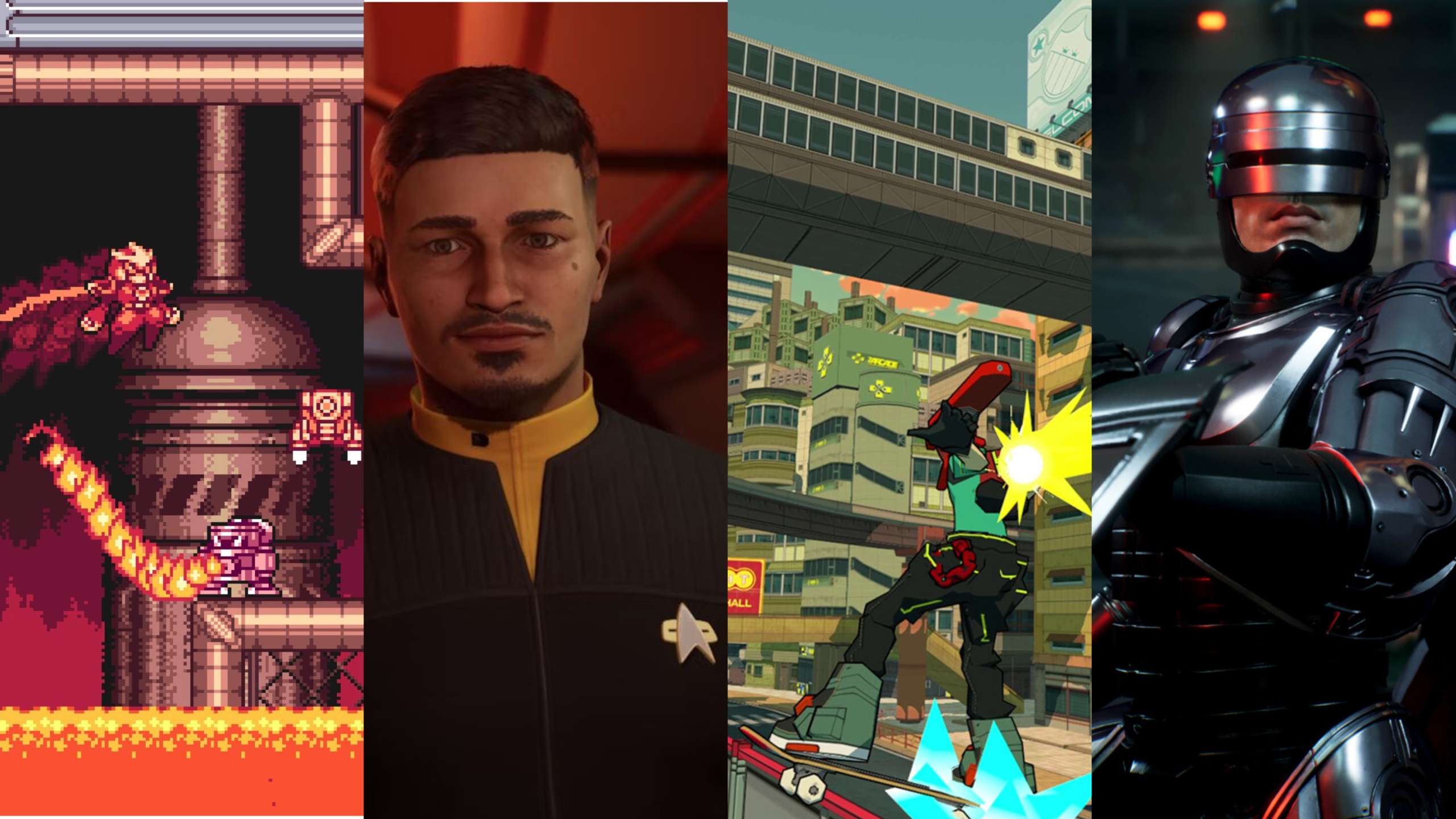
One of the best things about modern gaming is the often astonishing number of worthwhile titles that a historically diverse collection of creators are releasing across an unprecedented number of distribution channels. One of the worst things about modern gaming is the crushing realization that you will likely never find the time to come close to playing even a notable percentage of those games. It’s a hard reality that leads to more and more exceptional games going largely overlooked.
As I’ve said in years past, the true tragedy of that situation isn’t the idea that you won’t be able to play all those games but rather the reality that you will likely miss out on that one game that is perfect for you. While it’s tragically impossible to share an adequate number of words about all the games you may have missed that you just might fall in love with, it’s an all-too-rare pleasure of the job to at least be able to shine a light on a few such experiences.
Also, for the purposes of this article, I did not include any games that made our Best Games of 2023 list. I also tried to focus on titles that weren’t receiving a large number of notable nominations in other “Best of” breakdowns and award shows.
Backpack Hero
Jaspel (PC, Xbox One, Xbox Series X/S, PlayStation 4, PlayStation 5, Nintendo Switch)
Are you one of the many who enjoy inventory management mechanics in video games? Does the act of fitting that extra item into your grid-based backpack give you more joy than taking down yet another god or hulking beast? Well, Backpack Hero is pretty much the perfect game for you.
Backpack Hero is a roguelite title built almost entirely around the act of organizing items in your inventory. Though part dungeon crawler and part town builder, much of the joy in Backback Hero stems from finding, utilizing, and, yes, organizing its massive collection of items. While not the first game to utilize inventory management as its primary gameplay feature, Backpack Hero is a testament to the power of taking a seemingly simple (yet deeply satisfying) core mechanic and gradually growing it into a more traditional adventure.
Bomb Rush Cyberfunk
Team Reptile (PC, PlayStation 4, PlayStation 5, Xbox One, Xbox Series X/S, Nintendo Switch)
Few games wear their influences on their sleeves as proudly or clearly as Bomb Rush Cyberfunk. One look at this game will make many longtime Sega fans ask, “Wait, is that a new Jet Set Radio game?” While the technical answer to that question is “No,” I have a hard time imagining Sega ever delivering a modern Jet Set Radio experience that is quite as good as what Team Reptile managed to craft.
A quick look at Bomb Rush Cyberpunk will make its influences obvious, but you have to play this game to understand how good it feels. Its nearly perfect controls make skating, grinding, and spraying your way across its five boroughs a purely joyful piece of game design. It certainly doesn’t hurt that the game’s soundtrack is one of the year’s best or that its gameplay is sneakily deeper than what you’ll find in even the Jet Set titles.
Chants of Sennaar
Rundisc (PC, PlayStation 4, PlayStation 5, Xbox One, Xbox Series X/S, Nintendo Switch)
Inspired by the Tower of Babel mythology, Chants of Sennaar casts you in the role of a traveler who must navigate a massive tower filled with seemingly indecipherable symbols, words, and other bits of language. Slowly, though, you begin to see patterns in those pieces of language that allow you to gradually understand what they mean. Of course, every solution typically leads to more mysteries.
In many ways, Chants of Sennaar is a wonderful little puzzle game designed around the terror and thrills that come with learning a new language (or, in this case, several languages at once). The game’s greatest gift, though, is its ability to use all of that deciphering as the backbone for an often understated narrative about the value of communication. Like the classic Star Trek: The Next Generation episode “Darmok,” Chants of Sennaar doesn’t suggest that communication is the ultimate solution but rather the only logical place to start if you’re working towards something better.
Double Dragon Gaiden: Rise of the Dragons
Secret Base (PC, PlayStation 4, PlayStation 5, Xbox One, Xbox Series X/S, Nintendo Switch)
Though it feels somewhat odd to feature a name as notable as Double Dragon on this list, I’m shocked that Rise of the Dragons seemingly managed to fly under quite so many radars this year.
While Rise of the Dragons‘ beat-em-up gameplay is relatively simple by modern genre revitalization standards, the game finds its depth elsewhere. By utilizing a rougelite system that randomizes levels enough to encourage multiple playthroughs, Rise of the Dragons effortlessly incentives you to unlock new characters, try new team combinations, and punch and kick your way through ever-escalating challenges. It’s an incredible marriage of traditional concepts and modern refinements.
El Paso, Elsewhere
Strange Scaffold (PC, Xbox One, Xbox Series X/S)
As a lifelong Max Payne fan, I fell in love with El Paso, Elsewhere quicker and harder than I expect any otherwise reasonable person to even fall in “like” with the game. To be fair, I’m certainly not blind to the alienating nature of the game’s odd visuals/animations and generally homebrewed nature.
Stick with this game, though, and El Paso, Elsewhere will leave you wondering why that Max Payne-style of third-person slowdown-based shooting faded away quite so quickly as it did. You’ll struggle to find a more enjoyable pure action gaming experience this year, and even the game’s initially alienating elements become a trivial criticism once you realize the surprising depth of its storytelling and the undeniable brilliance of its sound design.
Exoprimal
Capcom (PC, PlayStation 4, PlayStation 5, Xbox One, Xbox Series X/S)
To be honest, Exoprimal is a deeply, deeply flawed game. If you told me you think that this is a straight-up bad game, I wouldn’t be offended. Exoprimal‘s utterly bizarre mix of PvPvE, sci-fi, hero-based multiplayer action is beset by problems at every logistical angle. Not the least of those problems is the fact that it’s incredibly difficult to find a good team of matchmade players to roll out with, and playing with a good team is pretty much essential to enjoying what this title has to offer.
However, when Exoprimal works, it works shockingly well. There is an Earth Defense Force-like quality to the game’s often absurd dinosaur-busting action, but that series rarely offers the depth of competitive and cooperative concepts that end up being Exoprimal’s greatest strength and weakness. It’s a gloriously absurd example of a widely different style of multiplayer gameplay that was likely a little too different (and ambitious) for its own good.
Gravity Circuit
Domesticated Ant Games (PC, PlayStation 4, PlayStation 5, Nintendo Switch)
Yes, Gravity Circuit is every bit the 8(ish)-bit Mega Man action gaming throwback experience it appears to be at a glance. For some, that will be more than enough reason to give this game a shot.
What you won’t necessarily see at a glance, though, are all the ways that Gravity Circuit challenges, evolves, and sometimes defies Mega Man conventions. The game’s emphasis on closer combat actually makes it feel closer to Castlevania or Ninja Gaiden in some ways, yet neither of the early entries in that series emphasized character upgrades or level exploration quite the way this game does. Gravity Circuit is also notably “easier” than the original Mega Man games, but that’s only because the game offers you so many navigation and defensive options that must be mastered. It’s an utterly fascinating amalgamation of 8-bit concepts that feels genuinely fresh despite its pleasant familiarity.
Homebody
Game Grumps (PC, PlayStation 4, PlayStation 5, Xbox One, Xbox Series X/S, Nintendo Switch)
Homebody traps you in a house and a time loop that are actively being terrorized by a mysterious masked murderer. Though the ultimate goal is to survive, escape, and uncover the many mysteries of your situation, getting there will require you to solve a fiendish series of elaborate puzzles expertly implemented into your seemingly modest surroundings. Of course, you’ll need to avoid the killer all the while.
Though Homebody‘s Steam page is quick to mention the game’s nostalgic charms, those are largely limited to genre references and a ‘90s-like visual style. The game itself is a rather unique (almost escape room-like) horror puzzle experience with a surprisingly deep story to tell. It’s the kind of mentally taxing and emotionally challenging gaming experience that makes up for its lack of universal appeal by being the perfect game for a certain type of player.
Jusant
Don’t Nod (PlayStation 5, Xbox Series X/S, PC)
Jusant’s core gameplay revolves around a surprisingly intricate series of rock-climbing mechanics. As anyone who saw the documentary Free Solo (or anyone who watched their stamina bar slowly deplete in Breath of the Wild as they inched toward safety) will tell you, rock climbing is an inherently thrilling and dangerous activity that naturally lends itself to exciting gameplay.
So why is Jusant often described as a cozy (or, in the developer’s own words, “meditative”) experience? Well, some of the game’s more peaceful pleasures come from the ways it organically forces you to succumb to the rhythm required to navigate its toughest courses. The puzzle-like nature of those climbs relies on a nearly perfect blend of consideration and execution that makes every inch of progression earned feel like a victory. It doesn’t hurt that the game’s often subtle (yet beautiful) visuals, soundtrack, and story always seem to make their presence known at the perfect moments.
RoboCop: Rogue City
Teyon (PC, Xbox Series X/S, PlayStation 5)
Yes, I previously shared a few words about my love for RoboCop: Rogue City before. However, this really is the kind of game that is going to be the star of so many “underrated gems” articles in the future, and I want everyone to know about it while there is still time to support it so soon after its debut.
Rogue City is janky in ways that we typically only associate with games released sometime around the mid-2000s. However, it’s the kind of jankiness acquired in the pursuit of a pure passion project. Developer Teyon clearly loves RoboCop, and they chose to showcase that love through a surprisingly deep, ultraviolent action experience that feels true to its title character’s capabilities and limitations. It’s a game that is punching so far above its weight that you can’t help but root for it as the scrappy underdog.
Slay the Princess
Black Tabby Games (PC)
I have to confess that I’m generally not a fan of visual novels. I respect the work that goes into those games and what they are often trying to achieve, but I often struggle with the ways that their best ideas sometimes necessitate stripping the video game medium down to its barest components.
Unfortunately, it’s surprisingly difficult to explain why Slay the Princess is such a wonderful exception to my “rules” about that genre without diving into spoilers. What I will say is that I’ve seen a few people compare this story of a princess who needs to be slayed to the brilliant Stanley Parable. If that comparison sets your heart aflutter, then be sure to give this labyrinth of increasingly wild narrative possibilities a shot.
Star Trek: Resurgence
Dramatic Labs (PlayStation 4, PlayStation 5, Xbox One, Xbox Series X/S, PC)
I wish I could call Resurgence one of the best Star Trek games in a very long time and leave it at that, but that is a sadly hollow statement. Despite the seemingly endless potential for exceptional adaptations, the fact remains that there have been very few great Star Trek games over the last several…decades. What good Star Trek games we do get are often forced to focus on just one of the elements that make that franchise so special.
Resurgence is something else entirely. Developed by former Telltale Games employees, it utilizes a choice-based adventure game format that is relatively similar to the legendary titles produced by that now-shuttered studio. In the process, it can focus on things choices, consequences, diplomacy, characters, and relationships more than most other Star Trek games ever have. Of course, those in search of bridge commanding, away team exploration, and action will not be left wanting for thrills.
Tera Nil
Free Lives (PC, Switch, Android, iOS)
Tera Nil throws you into a wasteland and asks you to slowly turn it into a thriving paradise of ecological possibility. How you go about doing that is very much up to you, but every path you take will be beset by a series of challenges designed to remind you how difficult it can be to turn relatively nothing into a thriving something.
Despite its almost SimCity-like appearance, Tera Nil is often closer to a puzzle-based variation of a more traditional real-time strategy game. Just as those games task you with turning a mass of land and resources into an army or empire, Tera Nil wants you to figure out how to turn relatively few tools into something you could have never imagined when you began. Where other strategy titles eventually descend into chaos, though, Tera Nils’ carrot is the lingering promise of watching true tranquility unfold. It’s a game for the gardeners out there who want to test their skills on a scale rarely seen in gaming.
The Cosmic Wheel Sisterhood
Deconstructeam (PC, Nintendo Switch)
The Cosmic Wheel Sisterhood stars a witch named Fortuna who has been banished from her kingdom for telling truth to power. Eventually, she strikes a deal with an ancient figure who allows her to build a deck of tarot cards that will allow her to gradually reclaim (and surpass) her considerable mystical abilities.
That brief description may lead you to believe that Cosmic Wheel is a Slay the Spire-like deckbuilding game. While elements of this game certainly fall into that category, finding the right combination of cards is really only a small part of the overall experience. The real joy of this title comes from realizing that all of its many choices have consequences that often stack upon each other to form a fate that may be quite unlike the fate of anyone else who plays this game. It’s a novel adventure that casts you as both the constructor and servant of fate in ways that will stick with you long after the cards have been folded.
This Bed We Made
Lowbirth Games (PC, PlayStation 4, PlayStation 5, Xbox One, Xbox Series X/S)
My love of a good detective game is typically only surpassed by my disappointment in the number of truly great detective games out there. It’s historically proven to be a tough genre to get right. While This Bed We Made is not without its shortcomings (including its incredibly short runtime), it is a thoroughly enjoyable mystery title that captures the best of detective gaming in often surprising ways.
This Bed We Made sends you back to the 1950s and casts you as a hotel maid who has just stumbled upon something she clearly wasn’t meant to see. Yes, there is a mystery you’re meant to solve, but what impresses me most about this game is how it acknowledges and plays with your natural desire to know more. Whose lives you choose to peek into and how you interact with the various guests and employees you meet along the way are matters largely up to you. It’s a game that doesn’t punish curiosity, though it never lets you forget the consequences.
The post The Most Underrated Games of 2023 appeared first on Den of Geek.












